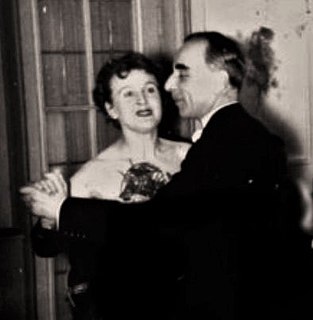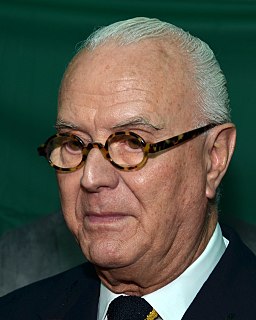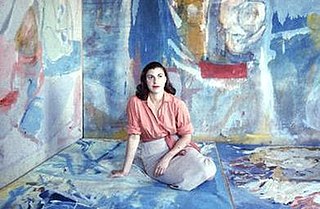A Quote by William A. Rusher
Well, I didn't read My Day by Eleanor Roosevelt very carefully. I was away during a lot of that, in the war and so on. She was not all that good a writer. She was a little bit on the banal side, and you know, what happened, and then this happened, and then that happened... But I will say this. She got very well paid for it.
Related Quotes
I was talking to my friend and he said his girlfriend was mad at him. I said, "What happened?" He goes: "Well, I guess I, uh... I guess I said something, and, uh... and then she got her feelings hurt." That's a weird way to phrase it: "She got her feelings hurt. I said something, and then she..." Could you more remove yourself from responsibility? "She got her feelings hurt." It's like saying, "Yeah, I shot this guy in the face, and then I guess he got himself murdered. I don't know what happened. He leaned into it."
I'm quite sure it happened in Berlin too when Eva [Braun] stayed there later on. I wouldn't know about that because I was scarcely ever there myself. I don't want to suggest she was crying all the time, but then they had their arguments, she was very downcast until she had cried it through. It happened on occasion.
Eleanor Roosevelt's very helpful to a lot of children who cannot speak French, who do not write well. And Marie Souvestre is fierce. She tears up students' papers that are not, you know, perfect. And Eleanor Roosevelt goes around, again, being incredibly helpful to children in need, children in trouble. And her best friends are the naughtiest girls who are in trouble. And she is a leader. And she is encouraged to be a leader. And everybody falls in love with her. She's a star.
I never watched those Spice Girls. I didn't enjoy that at all. So I didn't know Victoria Beckham well. But she came out with this pretty boy, got married, and the boy got more tattoos and more tattoos. And then I met her a few times, and we started work, and something happened. You know, she wanted it. She loves what she's doing.
A lot of people say that Eleanor Roosevelt wasn't a good mother. And there are two pieces to that story. One is, when they were very young, she was not a good mother. She was an unhappy mother. She was an unhappy wife. She had never known what it was to be a good mother. She didn't have a good mother of her own. And so there's a kind of parenting that doesn't happen.
Here I come to one of the memoir writer's difficulties -- one of the reasons why, though I read so many, so many are failures. They leave out the person to whom things happened. The reason is that it is so difficult to describe any human being. So they say: 'This is what happened'; but they do not say what the person was like to whom it happened. And the events mean very little unless we know first to whom they happened.
Eleanor Roosevelt loved to write. She was a wonderful child writer. I mean, she wrote beautiful essays and stories as a child. And Marie Souvestre really appreciated Eleanor Roosevelt's talents and encouraged her talents. Also, she spoke perfect French. She grew up speaking French. She's now at a french-speaking school where, you know, girls are coming from all over the world. Not everybody speaks French.
I mean, in the campaign of '24 and in '28 and '32, you know, Eleanor Roosevelt insists that women have equal floor space. And this is a great victory over time. Then she wants women represented in equal numbers as men. And she wants the women to name the delegates. And the men want to name the delegates. Well, Eleanor is absolutely furious. And because they don't want her to walk away in 1924, she wins. And this is a great political victory. She has floor space equal to the men, and she has the right to name the women.
"Baby, you know?" my mother once said to me. "I think you're the greatest woman I've ever met - and I'm not including my mother or Mrs. Eleanor Roosevelt in that." She said, "You are very intelligent and you're very kind, and those two qualities do not often go together." Then she went across the street and got in her car, and I went the other way down to the streetcar. I thought, "Suppose she's right. She's intelligent - and she's too mean to lie." You see, a parent has the chance - and maybe the responsibility - to liberate her child. And my mom had liberated me when I was 17.
A really good picture looks as if it's happened at once. It's an immediate image. For my own work, when a picture looks labored and overworked, and you can read in it as well - she did this and then she did that; there is something in it that has not got to do with beautiful art to me. And I usually throw these out, though I think very often it takes ten of those over-labored efforts to produce one really beautiful wrist motion that is synchronized with your head and heart, and you have it, and therefore it looks as if it were born in a minute.
I think that it is true that Eleanor Roosevelt, by being so active on that front, contributed to that impression very substantially. And it's to her credit that she was interested in this, let me say. But once again, I'm not sure the extent to which Roosevelt - I guess he did use her really, particularly on the civil rights front. No question about it, because she was well identified out there, and brought a good many blacks into the Administration, into the White House, into his presence and so on.
Well, when Eleanor Roosevelt's mother dies, she goes to live with her Grandmother Hall. And her Grandmother Hall is in mourning. She's in widow's weeds. She's in her 50s, but appears very old. And she's exhausted from raising rather out-of-control children. Her favorite daughter, Anna, has died (Eleanor's mother), and she has living at home two other sons, Vallie and Eddie. And they are incredible sportsmen, incredible drinkers, out-of-control alcoholics.
I think she [Eleanor Roosevelt] was a shrewd politician, and very good in public relations, although she had the usual media help in this. As a Republican and a conservative, I can say ruefully that the Democrats and the liberals tend to get it; that when she said something, it was put in a nice way and highlighted properly by the appropriate media, so that it sounded good.



























